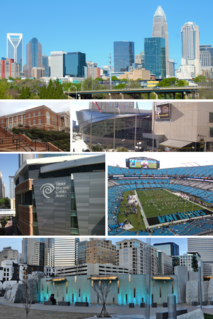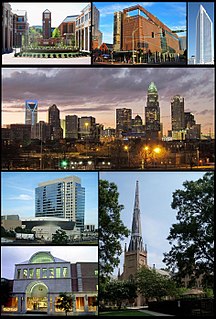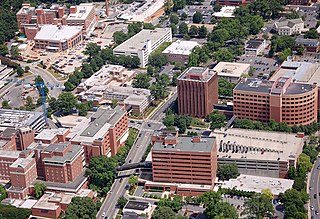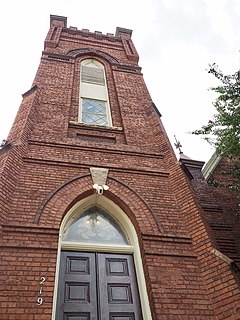
North Carolina is a state in the Southeastern region of the United States. North Carolina is the 28th largest and 9th-most populous of the 50 United States. It is bordered by Virginia to the north, the Atlantic Ocean to the east, Georgia and South Carolina to the south, and Tennessee to the west. Raleigh is the state's capital and Charlotte is its largest city. The Charlotte metropolitan area, with an estimated population of 2,569,213 in 2018, is the most-populous metropolitan area in North Carolina, the 23rd-most populous in the United States, and the largest banking center in the nation after New York City. The Raleigh-Durham-Cary combined statistical area is the second-largest metropolitan area in the state, with an estimated population of 2,079,687 in 2019, and is home to the largest research park in the United States, Research Triangle Park.

Charlotte is the most populous city in the U.S. state of North Carolina. Located in the Piedmont region, it is the county seat of Mecklenburg County. In 2020, the U.S. Census Bureau found that the population was 874,579, making it the 16th-most populous city in the U.S. and the second-largest in the Southeast behind Jacksonville, Florida. The city is the cultural, economic, and transportation center of the Charlotte metropolitan area, whose population ranks 23rd in the U.S., and had a population of 2,660,329, in 2020. The Charlotte metropolitan area is part of a sixteen-county market region or combined statistical area with a 2020 census-estimated population of 2,846,550.

Raleigh is the capital of the state of North Carolina and the seat of Wake County in the United States. It is the second-most populous city in North Carolina, the 41st-most populous city in the U.S., and the largest city of the Research Triangle metro area. Raleigh is known as the "City of Oaks" for its many oak trees, which line the streets in the heart of the city. The city covers a land area of 147.6 square miles (382 km2). The U.S. Census Bureau counted the city's population as 474,069 in 2020. It is one of the fastest-growing cities in the country. The city of Raleigh is named after Walter Raleigh, who established the lost Roanoke Colony in present-day Dare County.

Mecklenburg County is a county located in the southwestern region of the state of North Carolina, in the United States. As of the 2010 census, the population was 919,618. It increased to 1,110,356 as of the 2019 estimate, making it the second-most populous county in North Carolina and the first county in the Carolinas to surpass one million in population. Its county seat is Charlotte, and is the state's largest city.

Asheville is a city in, and the county seat of, Buncombe County, North Carolina, United States. Located at the confluence of the French Broad and Swannanoa rivers, it is the largest city in Western North Carolina, and the state's 12th-most populous city. According to 2019 estimates, the city's population was 92,870, up from 83,393 in the 2010 census. It is the principal city in the four-county Asheville metropolitan area, which had a population of 424,858 in 2010, and an estimated population in 2019 of 462,680.

Washington Heights is a neighborhood in the uppermost part of the New York City borough of Manhattan. It is named for Fort Washington, a fortification constructed at the highest natural point on Manhattan Island by Continental Army troops to defend the area from the British forces during the American Revolutionary War. Washington Heights is bordered by Inwood to the north along Dyckman Street, by Harlem to the south along 155th Street, by the Harlem River and Coogan's Bluff to the east, and by the Hudson River to the west.
Spirituals is a genre of music that is "purely and solely the creation" of generations of African Americans, which merged African cultural heritage with the experiences of being held in bondage in slavery, at first during the transatlantic slave trade—the largest and one of the most inhumane forced migrations in recorded human history, and for centuries afterwards, through the domestic slave trade. Spirituals encompass the "sing songs," work songs, and plantation songs that evolved into the blues and gospel songs in church. In the nineteenth century, the word "spirituals" referred to all these subcategories of folk songs. While they were often rooted in biblical stories, they also described the extreme hardships endured by African Americans who were enslaved from the 17th century until the 1860s, the emancipation altering mainly the nature of slavery for many. Many new derivative music genres emerged from the spirituals songcraft.

The University of North Carolina at Charlotte is a public research university in Charlotte, North Carolina. UNC Charlotte offers 24 doctoral, 66 master's, and 79 bachelor's degree programs through nine colleges: the College of Arts + Architecture, the College of Liberal Arts & Sciences, the Belk College of Business, the College of Computing and Informatics, the Cato College of Education, the William States Lee College of Engineering, the College of Health and Human Services, the Honors College, and the University College.

The Avett Brothers are an American folk rock band from Concord, North Carolina. The band is made up of two brothers, Scott Avett and Seth Avett along with Bob Crawford and Joe Kwon. Mike Marsh (drums), Tania Elizabeth (fiddle) and Bonnie Avett-Rini (piano) are touring members of the band.
The Charlotte Area Transit System (CATS) is the agency responsible for public transportation in the Charlotte metropolitan area. CATS operates bus and rail transit services in Mecklenburg County and surrounding areas. Established in 1999, CATS' bus and rail operations carry about 320,000 riders on an average week. CATS is governed by the Metropolitan Transit Commission and is operated as a department of the City of Charlotte.

Uptown Charlotte is the central business district of Charlotte, North Carolina. The area is split into four wards by the intersection of Trade and Tryon Streets, and bordered by Interstate 277 and Interstate 77. The area managed and overseen by the Charlotte Central City Partners, which is one of the three Municipal Service Districts in Charlotte. Uptown Charlotte is the largest business district in Charlotte and the Carolinas.

"Wade in the Water" is an African American jubilee song, a spiritual—in reference to a genre of music "created and first sung by African Americans in slavery". The lyrics to "Wade in the Water" were first co-published in 1901 in New Jubilee Songs as Sung by the Fisk Jubilee Singers by Frederick J. Work and his brother, John Wesley Work Jr., an educator at the historically black college in Nashville, Tennessee, Fisk University. Work Jr. —who is also known as John Work II—spent thirty years collecting, promoting, and reviving the songcraft of the original Fisk Jubilee Singers, which included being a member and director of the Fisk Jubilee Quartet. The Sunset Four Jubilee Singers made the first commercial recording of "Wade in the Water" in 1925—released by Paramount Records. W. E. B. Du Bois called this genre of songs the Sorrow Songs."Wade in the Water" is associated with songs of the Underground Railroad.

Elizabeth takes its name from Elizabeth College, a small Lutheran women's college founded in 1897 on the present-day site of Presbyterian Hospital. The community began in 1891 when a streetcar was established along East Trade Street to the area, making it the second oldest streetcar suburb in Charlotte. Elizabeth began to develop rapidly after 1902, when a trolley line was completed, and was annexed in 1907. Home of Independence Park, the first public park in the city, Elizabeth became one of the most fashionable residential areas in Charlotte in its early days. In 2006 Elizabeth had a population of 3,908.
The following is a timeline of the history of Charlotte, North Carolina, United States.
Joseph Charles Jones was an American civil rights leader, attorney, co-founder of the Student Nonviolent Coordinating Committee (SNCC), and chairperson of the SNCC's direct action committee.

French Street is a streetcar station in Charlotte, North Carolina. The at-grade island platform on Beatties Ford Road is the western terminus of the CityLynx Gold Line and serves the Biddleville neighborhood.
The Biddleville Quintette was a vocal group from the Biddleville neighborhood of Charlotte, North Carolina, United States, who recorded traditional black gospel for Paramount Records between 1926 and 1929.

Atlanta's Berlin Wall, also known as the Peyton Road Affair or the Peyton Wall, refers to an event during the civil rights movement in Atlanta, Georgia, United States in 1962. On December 17 of that year, the government of Atlanta, led by Atlanta mayor Ivan Allen Jr., erected a barricade in the Cascade Heights neighborhood, mostly along Peyton Road, for the purposes of dissuading African Americans from moving into the neighborhood. The act was criticized by many African American leaders and civil rights groups in the city, and on March 1 of the following year the barricade was ruled unconstitutional and removed. The incident is seen as one of the most public examples of white Americans fears of racial integration in Atlanta.

Brooklyn was a largely African American section of Charlotte, North Carolina. It was home to many businesses, residences, and churches. The neighborhood was demolished for an urban renewal project in the 1960s and is now part of what is known as the Second Ward.














